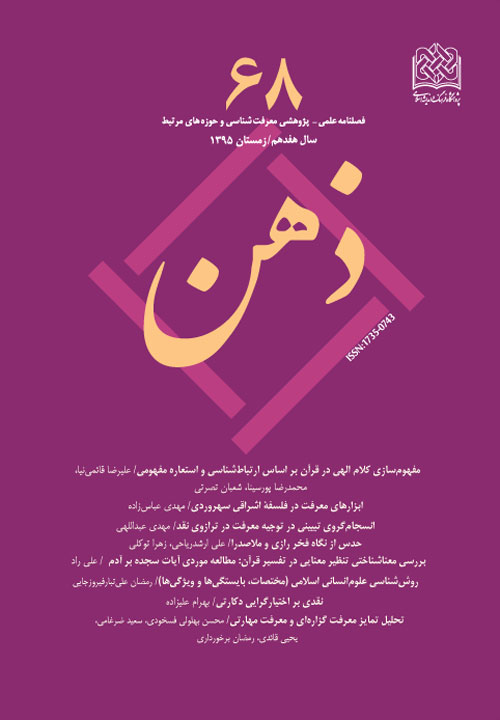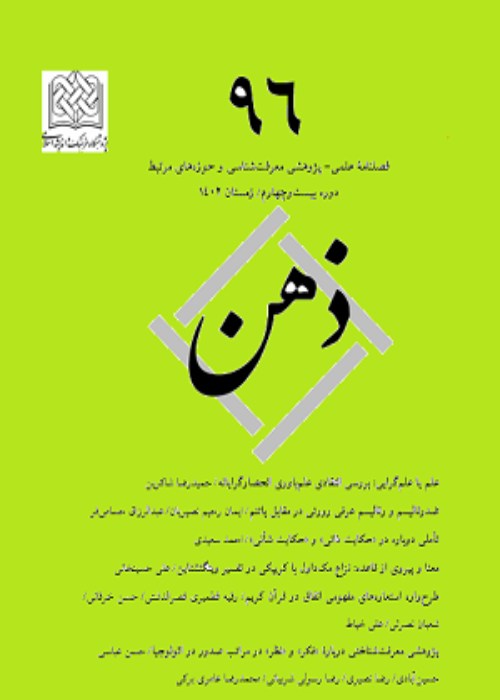فهرست مطالب

فصلنامه ذهن
سال هفدهم شماره 4 (پیاپی 68، زمستان 1395)
- بهای روی جلد: 60,000ريال
- تاریخ انتشار: 1395/12/10
- تعداد عناوین: 8
-
- مقاله پژوهشی
-
صفحات 31-70
-
صفحات 71-98
-
صفحات 99-120
-
بررسی معناشناختی تنظیر معنایی در تفسیر قرآن / مطالعه موردی: آیات سجده بر آدمصفحات 121-146
-
صفحات 177-206
-
صفحات 207-226
-
Pages 5-30The revealed realation to Gog is intuitive truth that is known only for receiver of it. Inquiry about this intuitive truth for me, requires refer to companions that obtaine from verses and hadith (the Quran and Traditions). This article attempt to maintain the closest meaning for Taklym(To Speak) God is "the Word of God as relationship Kalam '. here is used from method of cognitive semantic for consider this meaning and It's explanation according to two pattern of cognitive realation and conceptual metaphor. The pattern of cognitive realation define the features of verbal communication for us and the pattern of conceptual metaphor oppen our path to the Religious theories that possessing metaphorical feature. Outlined the mapping between the realm of verbal communication with the realm of the Divine Taklym shows us that there are many similarities between the two realms that can be discovered, and provided to the confirmations of the Quran and Traditions. As a result of this exploration leads to three important principles in God Taklym: First, there is the verbal communication between God and man; second, this communication is real and not abstract; and finally, the verbal communication with God is the kind of speech acts.Keywords: the Word of God, Cognitive semantics, Verbal communication, Conceptual metaphors
-
Pages 31-70The issue of mans epistemic instruments is fundamental in all schools of epistemology. In the illuminative philosophy of Suhrawardi this issue has been broadly discussed which led to innovative ideas in this regard, despite of some similarities with Peripatetic philosophy. Suhrawardi, in his works, has provided a triple division of epistemic instruments: 1. Sense (external and internal), 2. Reason, and 3. Mithal senses and heart. Innovations of Suhrawardi regarding epistemic instruments are important in especially four things: 1. the status of memory and fantasy 2- unity of illusion, imagination and fantasy 3. The relation of senses to soul, and 4. The special explanation of Mithal senses and heart. Mulla Sadr has severely criticized these innovations but has accepted his viewpoint about intuition. Some of contemporary thinkers have their own standpoints toward Suhrawardis ideas. All these criticisms and ideas, altogether, can provide us with a suitable base for reviewing Suhrawardis ideas in his discussion on the epistemic instruments.Keywords: Sense, Fantasy, Reason, Intuition, Soul, Suhrawardi, Mulla Sadra
-
Pages 71-98Although "foundationalism" is the classic theory of justification, criticism of this theory led epistemologists to put it away and developed new views the most important of which is coherentism. And most of coherentists believe in "explanatory coherence" theory. Explanation is the answer to the why-question of a phenomenon. Philosophers of science and epistemologist do not agree about the nature of explanation. Some have suggested deductive model, some others proposed an epistemic analysis of explanation, and ventually some have taken the conception of explanation as primitive. According to explanatory coherentists, S is justified in believing that p if and only if the belief of S that p is consistent with that system C of beliefs having a maximum of explanatory coherence among those systems of beliefs understood by S, and the belief that p either explains something relative to C which is not explained better by anything which contradicts p or the belief that p is explained by something relative to C and nothing which contradicts it is explained better relative to C. There are several objections to explanatory coherence including a) obtaining maximum of explanatory coherence by securing a minimum of content, b) having good but invalid explanations, c) equal explanatory coherence in competing systems. Coherentists efforts failed in response to objections.Keywords: Justification of belief, Coherentism, Explanation, Explanatory coherence, Sellars, Harman
-
Pages 99-120Logicians maintain that in a genre of inference, the required premises to attain the conclusion are not mentioned, but at the same time, this inference proceeds by the aid of conjecture which is a kind of capability for immediate receiving the middle term. The question of conjecture besides of logical function is also proposed in the theological discussions, for conjecture is used for explaining a kind of human perception which has a special level. Logicians have only deemed conjecture certain, but do not explain its modality. Thus in this paper which is prepared by the method of library software, we seek to know the nature and modality of conjecture, as well as its station and domain in the sensations and ultra-sensations. Fakhre Razi deems conjecture pertaining to the highest level of intellect in the sense of possession and excludes its data from the domain of certain knowledge. Mulla Sadra is not the first philosopher who explains the modality of the knowledge of the sacred soul by the element of "conjecture". Before him, Ibn Sina seems to have benefited from this factor. Studying Mulla Sadras works, it reveals that he deems conjecture the lowest stage of spiritual intuition and contrary to Fakhre Razi, counts its data certain. He maintains that conjecture is a kind of effusion from active intellect, whereas Fakhre Razi denies the active intellect and proposes the issue of complete nature. Complete nature, in the words of Mulla Sadra is called the Holy Spirit.Keywords: Mulla Sadra, Fakhre Razi, Conjecture, Complete nature, Sacred faculty
-
Pages 121-146A number of Shiite commentators believe verses of prostration of angels on Adam (AS) such as prostration on the Kabah and Yusuf (AS) and expalained the outcome this analogous that concept and kind of prostration on Adam (AS). Against this approach, ststus of Adam appear for angels as been Qiblah of Kaaba and Yusuf 's innovative beauty and this give them a task to prostration to Adam, but Adam wasnt their real prostrated thing. The main issue of this article is critique of analogous and examination of documentation based on analogous of correct interpretation in commentary. The results of article showed that the story of prostration to Adam is independent of the verses of prostration on Yusuf (AS) and the Kaaba, and don like with each other. The subject and cause of prostration in the three groupes of verses are different and also arent the authenticity of the prostrated person in a level. These verses are just a formal similarity in external instanc are similar to each other and this isnt sufficaant for interpretative inrelationship between these verses and must not be used them for interpretation each other.Keywords: Shiite interpretation, Meaning analogous, Mrostration to Adam, the Self meaning in the Quran
-
Pages 147-176The methodology of Humanities as second-class science,is on of main axis of philosophy of humanities. There are different approach about current Humanities and is shaped various schools like Positivism, Interpretive, Critical approaches, But were still at the beginning of discourse about Islamic Humanities and it's methodology. Recognition of "method of Islamic Humanities" is on of main problem. There are different questions about nature of method of Islamic Humanities, like what means method of Islamic Humanities? and What characteristics are? Some of properties and necessities of method of Islamic Humanities is consist of: be systematic and observance of demands of system and Islamic Model, dependence on Religious and Islamic principles, possessing of theoretical framework, flexible, possessing ofeoretical framework, flexible, possessing of different levels, comprehensive, completion, generalizable and etc. This article attempt to consider these properties.Keywords: Method of research, Methodology, Islamic humanities, The methodology of Islamic Humanities
-
Pages 177-206Compatibilism says that determinism is logically consistent with libertarianism.Libertarianism, as a branch from incompatibilist, argues that free will is logically incompatible with a deterministic universe, agents have free will, and therefore determinism is false. Was Descartes a libertarian? There is no doubt that he was a libertarian; The standard account of Cartesian dualism says that self could be a first cause without being effected by other causes. But I will say that his libertarianism is based on a compatibilist factor -spontaneity- instead of a incompatibilist one -alternative possibilities. Finally we can see that his view is a compatibilist in three aspects.Keywords: Descartes, Free Will, Free Judgment, Alternative Possibilities, Spontaneity, libertarianism
-
Pages 207-226Gilbert Ryle distinguished between knowing that and knowing how. Prefer to believe that either of these two forms of knowledge than others, radical intellectualism or anti-intellectualism has shaped. This article aims to analyze and critique of radical intellectualism and anti-intellectualism attitude and suggest new model is as moderate intellectualism. The method used in this paper is Ryle's analysis of ordinary language. In order to illustrate this, the concept of intellectualism and anti-intellectualism in the relationship between knowing that and knowing how on the one hand and knowing how and abilities on the other hand has been dealt. In moderate intellectualism pattern propositional knowledge independent of practical knowledge, and ability is not necessarily require a knowing how. This new scheme to distinguish between two types of knowledge and at the same time believe to the fundamental role of knowing that to achieve s appropriate knowing how. In this approach, knowing that is implicit and gradual in shaping the knowing how.Keywords: Knowing that, Knowing how, Intellectualism, Antiintellectualism, Moderate Intellectualism


